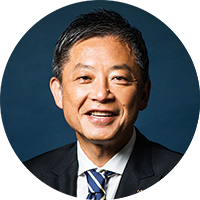Coach's VIEW is a business column authored by executive coaches in COACH A, aimed at providing valuable insights and effective approaches for leveraging coaching to foster organizational and leadership development. The column draws on the latest coaching trends and data, as well as insights from notable global publications on coaching.
Making Feedback Your Own

The other day, I had the opportunity to participate in a three-way meeting involving Mark, my executive coaching client, and his supervisor. During the meeting, Mark's supervisor expressed a desire for me, as a coach, to provide more critical feedback to Mark. It seems that from the supervisor's perspective, Mark is participating in feedback exchanges but not fully internalizing and embracing the feedback provided. This led me to reflect on why the supervisor perceives Mark's engagement in feedback exchanges and prompted me to assess my own feedback ability as a coach. What could be the underlying reason for this observation, and what does it imply?
Two Aspects to Feedback Skills: Giving and Receiving
Regardless of who you are, there are "blind spots" that you cannot see about yourself. Just as you cannot see your own back without a mirror, recognizing these blind spots requires the perspective of a third party. This is an important aspect of our role as coaches. We ask questions and provide feedback to help refine the leadership of our clients and shine a light on their blind spots. In other words, enhancing our feedback skills as coaches is crucial.
Not only for coaches but also for individuals working within organizations, there are numerous opportunities where feedback skills are required. These include feedback from supervisors to subordinates during performance evaluations, as well as feedback from subordinates to supervisors and through 360-degree evaluations. Feedback is utilized in various forms. The purpose is to reduce blind spots within the organization and strive for improvement by creating a feedback loop.
Regarding feedback within organizations, there is a book that presents survey results on the subject, as mentioned below. (※)
"When senior executives in the HR department were asked about the greatest challenges in HR management, 63% of them cited the lack of ability or willingness among managers to engage in difficult conversations during feedback sessions."
It is evident that improving leaders' feedback skills is an important theme for organizations. However, within the same book, there is also the following description.
"Even if the skills of the feedback provider improve, significant effects cannot be expected if the recipient is unable to internalize the feedback. Whether to accept the feedback, how to interpret its content, and whether to change thoughts and actions accordingly are solely determined by the recipient."
When we hear the term "feedback skills," we tend to interpret it as the ability to give feedback. However, to fully leverage the value of feedback, it may be necessary to also focus on improving our "receiving skills" in addition to our "giving skills." So, what exactly is the ability to receive feedback, and how can we improve this skill? How can we enhance our capacity to accept and benefit from feedback?
Separating Feedback Providers and Content
In coaching, when dealing with 360-degree feedback, many clients actually express concerns about "who the feedback is coming from." Even if they receive feedback with the exact same content from their superiors, colleagues, and subordinates, differences in how they perceive and receive the feedback often arise based on the source.
I believe that here lies a hint to one aspect of the ability to receive feedback.
* * *
One of my clients, Steve, is an exceptional leader who has achieved numerous successes. When we began coaching, we conducted a 360-degree evaluation to gather an understanding of their current situation.
The results showed that he received predominantly positive evaluations both quantitatively and qualitatively from colleagues and superiors. However, there were numerous negative feedback responses from direct subordinates. Upon seeing this, Steve immediately dismissed it, attributing the issue to the subordinates. He stated, "The problem lies with my subordinates. They can't keep up because I have high standards. They are not accustomed to the pressure I apply to deliver results."
Steve's perspective may be valid. However, the feedback results themselves are also a reality. Where is the evidence to support the claim that "Steve is right, and the subordinates are wrong"? His reluctance to acknowledge the information about how he is perceived by his subordinates gives the impression that he is deflecting his management challenges onto the capabilities of his subordinates. Therefore, during the coaching session, I made sure to inquire about his actions and thoughts, while also exploring the reactions of those around them.
- Why do you think there is a difference between the responses from colleagues/superiors and those from subordinates?
- What thoughts and feelings might have influenced the subordinates' responses in the assessment?
- How would you like to utilize this assessment to improve overall organizational performance?
By delving into these questions, we can gain a deeper understanding of the situation and explore ways to leverage the assessment for enhancing the performance of the entire organization.
While answering those questions, Steve began to shift their perspective from "who" is providing the feedback to considering the content from the standpoint of his own "influence" on others. Subsequently, he started engaging in dialogues with his subordinates about how he could behave in a way that would allow them to progress together towards their shared goals. Separating the content of the feedback from the providers themselves is indeed one aspect of the ability to receive feedback. By focusing on his own influence and considering how his action can contribute to a positive and collaborative environment, Steve is taking a step towards improving his feedback reception skills.
* * *
Receiving feedback is essential for personal growth. However, for anyone, having their blind spots pointed out is not always a pleasant experience. The reality is that almost everyone experiences some level of conflict when receiving feedback. However, it's important to remember that your own growth is in your hands. With this perspective, you can learn from any feedback, regardless of its source. As a result, you will become better able to assess and choose appropriate actions that align with the outcomes you desire.
【REFERENCE】
※”Emotional Intelligence, Self-Awareness” by Harvard Business Review Translated in Japanese by Diamond Publishing, 2019
*Regardless of profit, non-profit or intranet, secondary use such as copying, diversion, selling etc. is prohibited without permission.
Language: Japanese

